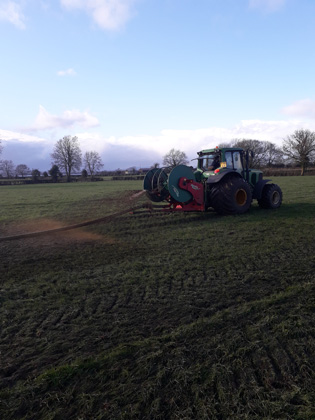Spreading slurry, Protecting our water
08 February 2019 16:17

NI Water would like to take this opportunity to remind our farming customers to think carefully before spreading slurry so that there is no ammonia risk for our watercourses. This is particularly relevant at this time of year as tankers are getting dusted down again after the winter closed period. It is well understood that Nitrogen is a critical component of our agricultural system with plant life being dependant on the nitrogen cycle to produce that fresh farm produce from our local farms. However, if not managed correctly nitrogen applications from farm slurry can lead to negative environmental consequences in both gaseous forms and runoff to fresh waters.
NI Water Catchment Manager, Roy Taylor says “NI Water abstract raw water from a number of lowland lakes and rivers in order to supply wholesome drinking water that we all rely on to thrive. If slurry is spread on poor ground or during wet weather conditions, it can result in high ammonia levels in our watercourses, which can be difficult and expensive to treat in order to provide the high quality drinking water we all expect.”
NI water also use a number of upland catchments to supply drinking water and we ask farmers to take due care in spreading slurry in areas where the plant species are adapted to low nitrogen. The effects on these sensitive habitats to nitrogen, has potential to damage plant species. This not only damages the environment but also has an impact on the natural filtering properties these plants have on the raw water as it flows towards NI Water’s impounding reservoirs.
In order to minimise the impact of ammonia deposition, NI Water encourages farmers to follow best practice and only spread slurry where land and weather conditions allow, always checking weather forecasts before spreading as rainfall could wash valuable nutrients off your land.
Better management of slurry and manure can:
• Increase business profitability by maximising the value of slurries and manures.
• Minimise the risk of local watercourses becoming contaminated.
• Reduce the risk of disease transfer, if you abstract water from a watercourse or borehole as your source of livestock drinking water.
• Help to reduce the farm carbon footprint by maximising the value of your fertilisers.
• Contribute to protecting and enhancing local water quality for fish, wildlife and amenity use.
• Keep on the right side of the regulations and help to protect your farm basic payment.
Roy Taylor is the Catchment Manager at Northern Ireland Water